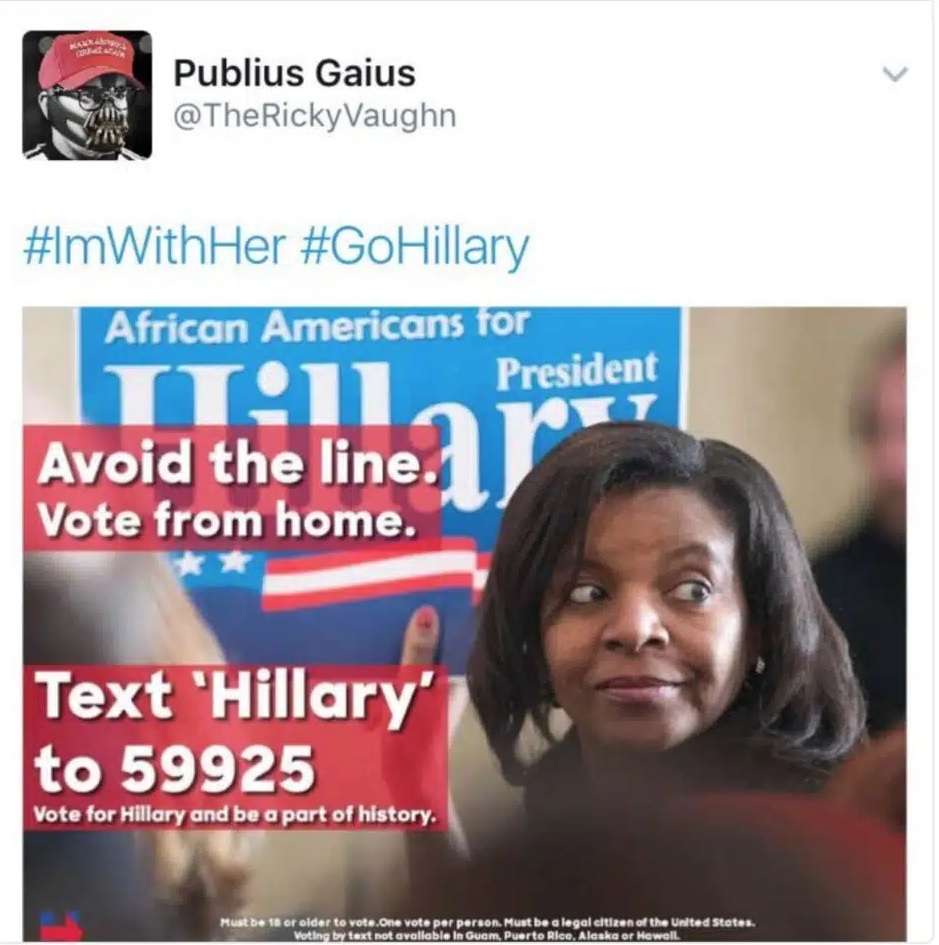In 2016, meme-maker Douglass Mackey decided to lampoon Democrat Party voters by creating and posting an image that claimed they could vote simply by texting “Hillary” to a cell phone number, instead of waiting hours in line. The joke was posted to his popular “@TheRickyVaughn” page on Twitter, known for its biting satire.
This week, Mackey was convicted in Brooklyn, New York, on a charge of Conspiracy Against Rights stemming from what the U.S. District Attorney’s office called “his scheme to deprive individuals of their constitutional right to vote.”
United States District Judge Ann M. Donnelly – an Obama-era appointee previously famed for blocked a Trump-era executive order for the deportation of migrants – presided over the week-long trial that Twitter users are now pointing to a direct infringement of their First Amendment rights.
Mackey faces 10 years in prison, with sentencing due in August. And though his lawyers claim they are “optimistic about our chances on appeal,” a precedent for pursuing meme-makers through the courts has now been set.
Interference.
Mackay’s trial was rescheduled at the beginning of March due to constitutional and fairness concerns. In the run-up to trial, far-left agitators such as the Huffington Post’s Luke O’Brien had sought to demonize Mackey in the media, referring to him as an anti-Semite, white nationalist, and political extremist.
Additionally, a key witness for the prosecution appears to have been a member of one of Mackey’s online groups who appears to have worked as an undercover informant. Said informant – another online troll by the name of ‘Microchip’ – is a “a fascist accelerationist who has expressed admiration for Adolf Hitler and Nazism,” according to O’Brien.
Microchip is believed to have taken a plea deal with the government in 2022, and collaborated to help prosecute fellow meme-makers.
The U.S. Department of Justice demanded the name of the witness remained undisclosed which, as argued by Mackey’s attorney, could violate the confrontation clause in the U.S. Constitution. In justifying this measure, the DoJ argued that to reveal the name of the agent would encourage “online harassment”.
Hypocrisy.
A number of Mackey’s supporters have highlighted similar actions by Twitter user “Kristina Wong,” who made memes targeting Trump voters by telling them to vote on “November 9th” while wearing a MAGA hat. She was neither charged nor investigated.
Two tiered justice system! pic.twitter.com/7hLmpT6rv3
— Ben Kew (@ben_kew) April 1, 2023
Mackey said of the news: “My conviction essentially means there is no First Amendment protection of speech… If you make a meme they don’t like, the Federal Government will come after you”.
“It was no criminal conspiracy. It was the internet,” defense lawyer Frisch said in his closing argument. He added that although roughly 4,900 people called the vote-by-text number, “No one was tricked.”
“If a single voter was tricked, the government would have called that person as their first witness,” he said.
Indeed no such witness emerged.
Instead, the jury heard from a former Hillary Clinton campaign staffer, as well as the owner of a text message marketing company.
U.S. Attorney Breon Peace said the verdict proves “the defendant’s fraudulent actions crossed a line into criminality and flatly rejects his cynical attempt to use the constitutional right of free speech as a shield for his scheme to subvert the ballot box and suppress the vote.”



